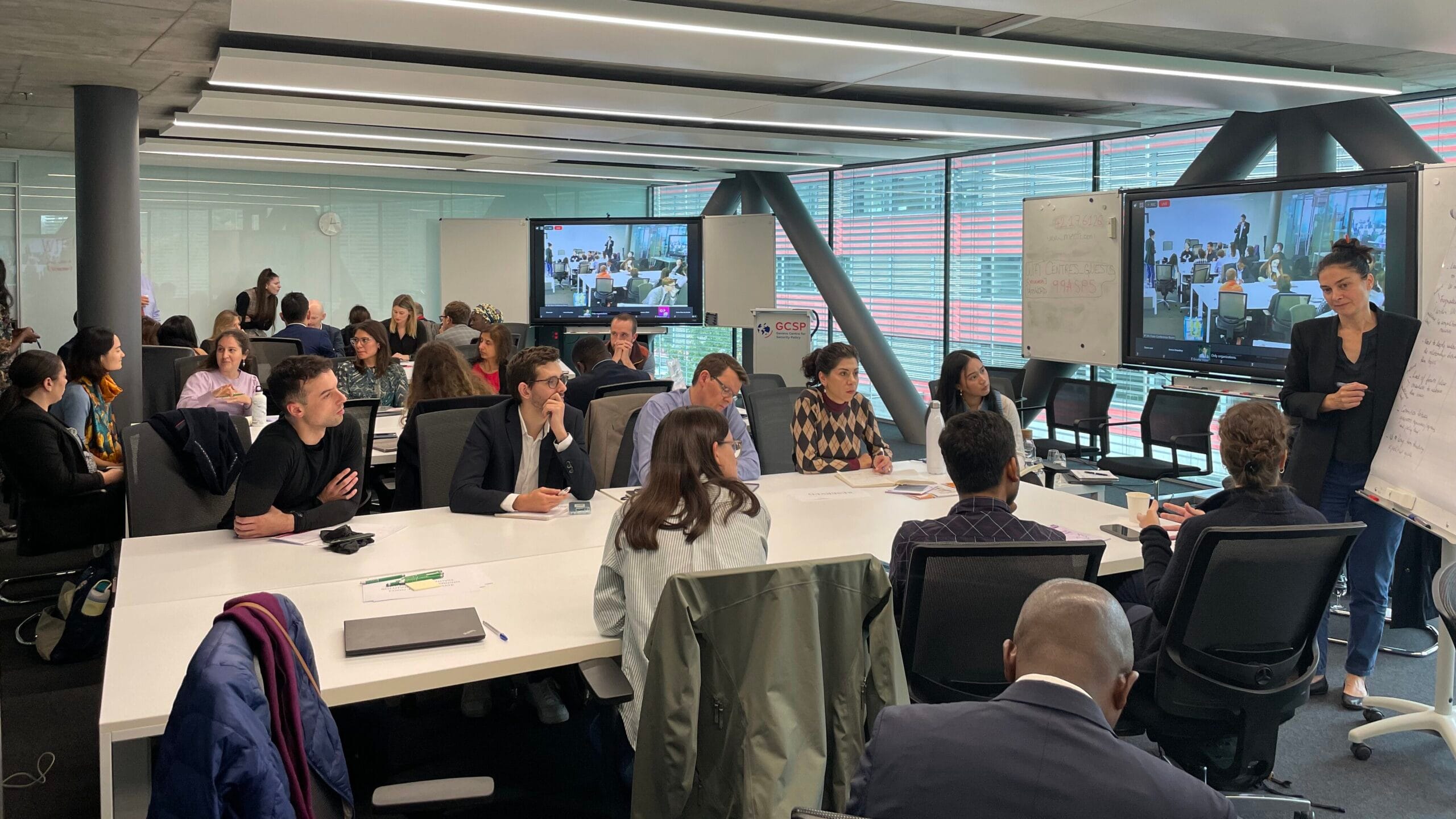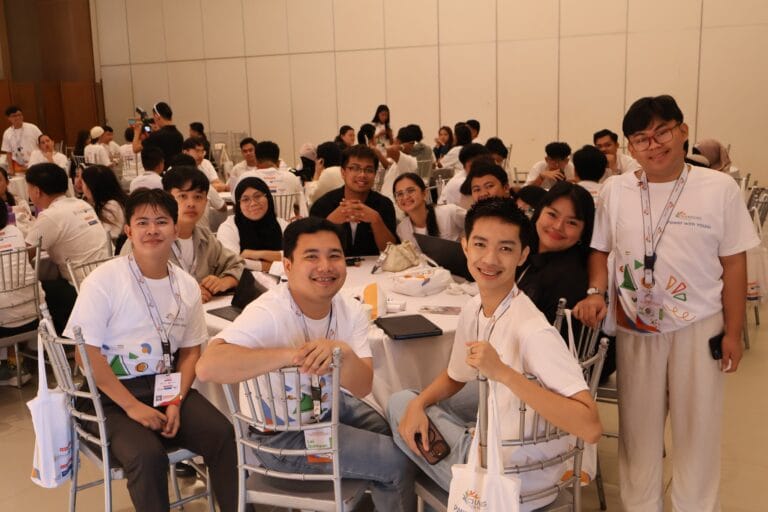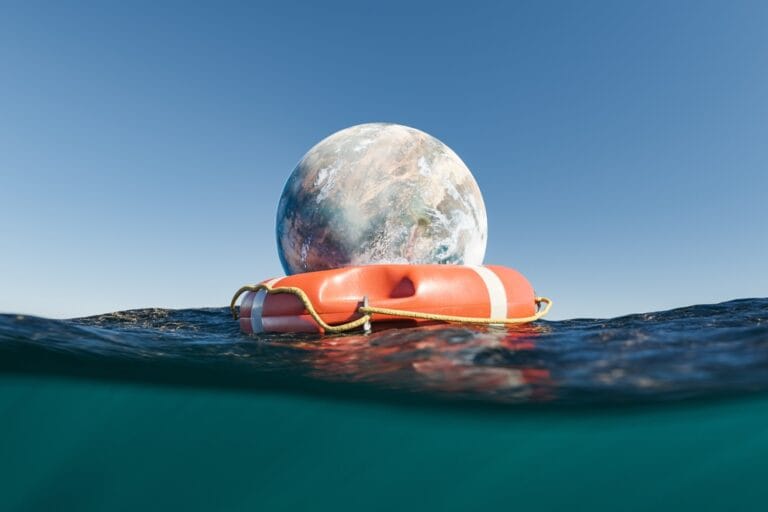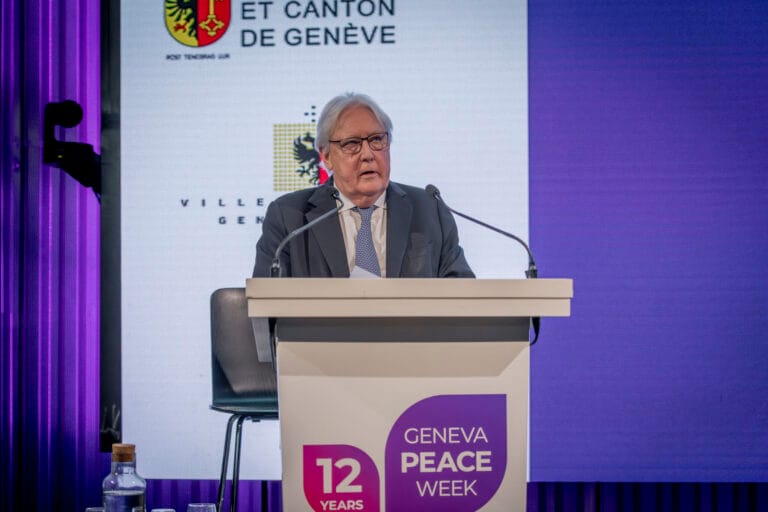The years 2023 and 2024 have witnessed the highest number of active conflicts since World War II , the hottest temperatures on record and the highest number of people facing hunger globally. These crises cannot be addressed in isolation. 9 of the 10 most climate-vulnerable countries are food insecure, over a dozen countries face food-crisis-driven instability, and extreme weather events are causing devastation to food ecosystems. Improving and strengthening collaboration between peace, food and nutrition security, and climate and environment is an imperative.
As part of the 11th edition of Geneva Peace Week, the Kofi Annan Foundation, together with the Ban Ki-moon Center for Global Citizens (BKMC) and the Stockholm International Peace Research Institute (SIPRI), hosted a workshop on “Inspiring New Thinking: Environmental and Food Security Solutions for Peace”.
The discussion focused on the current risks and challenges of the multiple and intersecting environmental, conflict and food crises. Participants, practitioners, researchers and representatives from international organizations, reflected on the obstacles to cross-sectoral cooperation at the nexus of environment, climate, food and peace, and proposed solutions to overcome them.

Some of the main points and recommendations which emerged include:
Practical examples to breaking silos
Our panelists shared examples of how climate change, conflict, and food insecurity intersect to increase vulnerability. Northern Nigeria faces insecurity from banditry, kidnapping and insurgency restricting access to farmland and opportunities to earn a living. Recent spells of dry weather and heavy rains have displaced over 16,000 people and destroyed crops. A vital agricultural hub, the region faces a dual threat of climate-related challenges and banditry violence, both of which compound the risks to food security.
In Africa, smallholder farmers produce 85% of the continent’s food, making their experiences indispensable for understanding how the combined impacts of climate change and conflict unfold on the ground and affect food security. Addressing these complex crises requires long-term, integrated responses that prioritize the perspectives and insights of those directly affected. Breaking down silos demands more than institutional reforms – it requires shifting mindsets from competition to collaboration. Capacity building opportunities for donors and philanthropic actors can help raise awareness of links and opportunities to foster cross-sector collaboration and enhance response effectiveness. Empowering those on the frontlines, such as smallholder farmers, not only to share their stories, but also to develop and implement tailored adaptation strategies is essential for building resilience and fostering sustainable, holistic solutions.
Addressing inclusion at the intersection of peace-climate-food
Those most affected by decisions and policies need to be more central in the climate, peace and food discourse. Harmful biases and stereotypes—whether rooted in racism, sexism, or other forms of discrimination—still hinder the equal participation of partners. Globally, only 2.6% of parliamentarians are 30 or younger, even though this age group represents the median age of the world’s population. In the Philippines, where 28% of the population is between the ages of 10 and 24, 7 out of 10 young people feel that politicians do not listen to them. The country, which is the most vulnerable to natural disasters globally, faces further challenges due to corruption and poor governance, undermining the government’s ability to provide essential services like education amid extreme heat and flooding. Leadership must take responsibility for addressing these challenges through sound policies, improved infrastructure, and the inclusion of youth perspectives.
The voices of grassroots communities can be amplified by creating opportunities for them to conduct research on issues that directly affect their lives. This vision is at the heart of the initiative led by the KAF, SIPRI, and local partners, with support from the Global Challenges Foundation. Together, we launched Youth Research Informing Global Climate and Conflict Responses that highlights the experiences of young people in six climate and conflict vulnerable countries – Burkina Faso, Niger, Pakistan, the Philippines, Somalia and Uganda – and provides actionable recommendations to address these challenges.
Additional recommendations for fostering inclusion in addressing the climate-conflict-food nexus included overcoming accessibility barriers. For example, hosting global summits and conferences in locations that are easier to access—considering visa challenges and financial constraints—can better enable the participation of underrepresented groups. Additionally, participants highlighted increased flexibility from donors as a critical measure to enhance inclusivity and responsiveness to local needs. One innovative proposal was the introduction of quadratic voting, a method that takes into account not only the votes cast but also the intensity of the opinion behind them, enabling a more nuanced and equitable decision-making process.
Innovative and novel solutions to governing food-peace-climate
Innovative governance of the complex food-peace-climate nexus requires addressing several structural and operational challenges. Member states’ resistance, fragmented mandates within the UN system and national governments, and the absence of a unified platform for tackling these interlinked issues undermine cohesive action. Short political cycles, which discourage long-term planning, and limited understanding of the intricate relationships between food security, climate change, and peacebuilding further complicate progress. Additionally, the insufficient inclusion of grassroots perspectives in policymaking creates a disconnect between local realities and high-level strategies.
To overcome these challenges, reforms in multilateral systems and enhanced cross-thematic collaboration are essential. Promising developments include the UN Climate Security Mechanism and the deployment of climate security advisors within the UN system, along with climate and peace initiatives led by the UN Peacebuilding Fund (UNPBF). At the regional level, the African Union’s efforts to establish a common position on climate security highlight a growing recognition of the need for integrated approaches. Expanding programs such as the UNDP Climate Security Academy and creating a global knowledge-sharing portal to consolidate best practices would enhance understanding and coordination. Finally, amplifying the impact of local initiatives on the global stage would bridge the gap between grassroots needs and policy, fostering governance systems that are both inclusive and effective.
About the workshop
Over 40 practitioners, researchers and representatives from international organizations came together on 16 October 2024 in Geneva, Switzerland, to discuss innovative peacebuilding solutions that integrate both environmental sustainability and food security as tied to the peacebuilding agenda.
As part of the Geneva Peace Week 2024, this hybrid workshop was convened by the Kofi Annan Foundation (KAF), the Ban Ki-moon Centre for Global Citizens (BKMC) and the Stockholm International Peace Research Institute (SIPRI). It was co-organized and moderated by Ayooshee Dookhee, Project Manager of the Kofi Annan Commission on Food Security (KACFS), Kofi Annan Foundation. The workshop featured expert inputs from Amir Abdulla (Former Deputy Executive Director, World Food Programme and Kofi Annan Commission on Food Security Commissioner), Arizza Nocum (President, KRIS for Peace & Extremely Together Young Leader, Kofi Annan Foundation), Halima Sadiya Ahmad (Founder, Nurtured Agro-resources Limited & Youth AgriChampion, Ban Ki-moon Centre for Global Citizens) and Katongo Seyuba (Researcher, SIPRI), who provided crucial insights on the challenges and gaps in the food-climate-peace nexus.
Note: The reflections in this article are drawn from the discussions held during the workshop and remarks made by panelists or participants. The views expressed in this piece do not necessarily reflect the views of the Kofi Annan Foundation or individual participants.

From left to right: Katongo Seyuba (Researcher, SIPRI), Halima Sadiya Ahmad (Founder, Nurtured Agro-resources Limited & Youth AgriChampion, Ban Ki-moon Centre for Global Citizens), Amir Abdulla (Former Deputy Executive Director, World Food Programme and Kofi Annan Commission on Food Security Commissioner), Ayooshee Dookhee (Project Manager of the Kofi Annan Commission on Food Security, Kofi Annan Foundation) and Arizza Nocum (President, KRIS for Peace & Extremely Together Young Leader, Kofi Annan Foundation).




